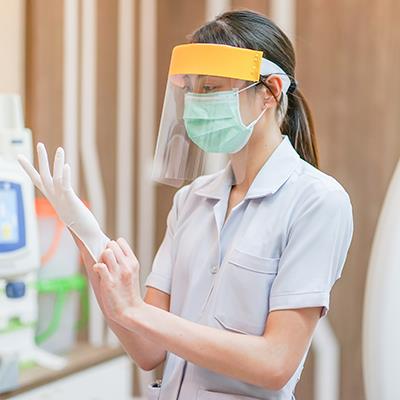
Masks and face coverings have been hotly debated when it comes to their role in curbing COVID-19. But new research published in the Journal of the American Medical Association adds mounting evidence that masks do, indeed, help prevent the spread of the new coronavirus.
The study conducted at Mass General Brigham, the largest health care system in Massachusetts, including 12 hospitals and over 75,000 employees, found that masking was associated with significantly lower infection rates among health care workers. An association that, authors write, “may be related to a decrease in transmission between patients and health care workers and among health care workers.” In other words, wearing a mask helps prevent the spread of germs to others, but it also seems to help keep the person wearing the mask from getting sick with COVID-19, too.
In March 2020, as coronavirus swept the Northeast, Mass General Brigham began requiring all health care workers and patients to wear masks in addition to undergoing routine symptom screening and testing. For this study, researchers wanted to assess the infection rates for SARS-CoV-2, the virus that causes COVID-19, among Mass General Brigham health care workers before and after this policy was put in place. They did so by using electronic medical records to examine data between March 1 to April 30, 2020, to identify health care workers providing patient care who had symptoms of and were tested for COVID-19.
Of the 9,850 health care workers tested over the study period, 1,271 (13%) tested positive for the new coronavirus. The team compared rates during the pre-intervention period (March 1 – 24) to the intervention period (April 11-30) and factored in a transition period from March 25 to April 11 to account for a lag in symptoms. Before universal masking, rates of confirmed COVID-19 infection among health care workers rose dramatically from 0% to 21% in a matter of weeks with cases doubling every 3 to 4 days. But after the universal mask policy was adopted, the rate of positive COVID-19 infection among health care workers with symptoms dropped from 15% to 11.5%.
Experts say these data show that masking plays an important role in reducing disease spread. Although they said downward trends in COVID-19 activity may also have been influenced by other interventions inside and outside of the health system (for example, no-visitor policies, delayed procedures, social distancing), it appears that declines in cases went beyond what could be explained by other interventions. Numbers of COVID-19 cases continued to rise in Massachusetts throughout the study period.
Findings Support Community Use of Masks, Too
While researchers studied health care workers, they said the results also apply to other situations in which social distancing is not possible.
Experts from the Centers for Disease Control and Prevention (CDC) wrote an accompanying editorial supporting the idea of universal masking and explaining that covering mouths and noses serves two purposes: 1) to protect you from breathing in harmful infectious virus and 2) prevent exposing others to infectious microbes if you may be carrying the virus and sneeze, cough, or talk and expel droplets into the air.
“There is ample evidence that persons without any symptoms spread infection and may be the critical driver,” they write. Masks are one tool to help prevent or slow the disease.
Meanwhile, in a separate study published in PloS Medicine, researchers show that three behaviors—regular hand washing, mask wearing and keeping a physical distance from others—may be key ingredients to help curb the COVID-19 pandemic before a vaccine is available.
For more information about COVID-19, visit CardioSmart’s Coronavirus (COVID-19) Hub.